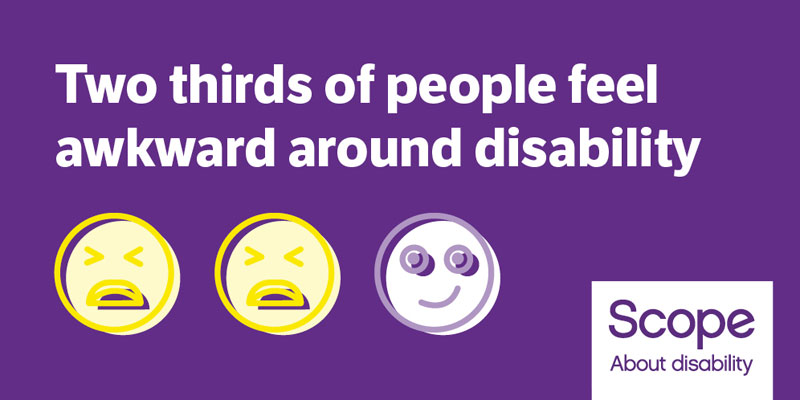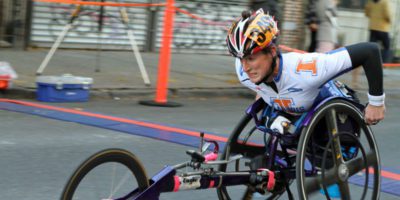Richard Lane is group head of campaigns, digital and marketing at the disability charity Scope. He has previously worked at Stonewall on their Equal Marriage campaign and the Rainbow Laces campaign to tackle homophobia in football. Richard is a campaigner and communicator who manages Scope’s campaigns and stories teams.
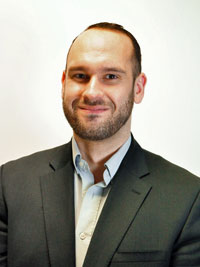
“…We know some people can feel a bit awkward around disabled people, but more often than not it’s coming from a good place because it’s about not wanting to offend. We call this ‘innocent ignorance’. End the Awkward is all about changing that…”
Finding my passion for campaigning and making a difference
I started out working in politics after I left university. I always knew that I wanted to work in a field that I was passionate about and where I thought I could make a difference. It sounds like a real cliché, but that was what motivated me.
After I finished university I worked as a parliamentary researcher for a while, before heading out to the US to work on political campaigns in the run up to the 2008 presidential election. After I came back to the UK I worked for a leading think tank managing events and campaigns. I was lucky to land a dream job at Stonewall after that, where I worked on the equal marriage campaign, our wider parliamentary work and the high-profile Rainbow Laces campaign. From there I branched out in to work on press and communication.
In 2015 I was lucky enough to join Scope. I think the LGBT movement in the UK has probably been one of the most successful civil rights movements in history. I was really excited about the huge amount of parallels between the fight for gay rights and the fight for disability equality. I think there’s a lot of lessons that can be learnt and shared and that’s one of the things I hope I’ve been able to bring to Scope.
My role on a day to day basis
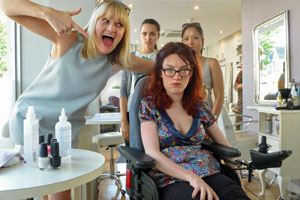
Outside of that I manage a large team doing a hugely diverse array of work. I’m extremely lucky that my team are so incredible at what they do. The people I line manage oversee all of Scope’s digital output – everything from our film team, social media, blogs and our website – as well as our marketing for all of our campaigns, services and shops.
I also oversee our Stories Team which I think has been built in to a real sector leader. We develop relationships with hundreds of storytellers every year to make sure that the voice of disabled people is at the heart of everything we do.
As a team we also manage a large budget. We’re incredibly careful how we spend our money. It was always drilled in to me in previous jobs in the charity sector that every penny you spend is money donated by supporters. You should always be able to look them in the eye and justify how you spend your money.
Scope’s End the Awkward attitude campaign
Our End the Awkward campaign aims to challenge attitudes to disability by shining a light on the awkwardness that many people feel around disabled people. Research by Scope shows that the majority (67%) of Brits feel awkward about disability.
We wanted to raise this issue in a light-hearted way, because it isn’t about pointing fingers. But it can have a serious side. Many disabled people continue to face negative attitudes, in the playground, in the street, and from employers. We hope our campaign will start conversations about disability and get us all thinking about what we can do to include disabled people more in our lives.
We know some people can feel a bit awkward around disabled people, but more often than not it’s coming from a good place because it’s about not wanting to offend. We call this ‘innocent ignorance’. End the Awkward is all about changing that.
Our research shows nearly half of the British (43%) do not personally know anyone who is disabled. So when people do meet disabled people, they don’t know what to do. They panic, or worse, avoid situations for fear of doing the wrong thing. Our campaign is about getting past that and feeling confident, because someone’s impairment is just one part of who they are.
We’re planning to release videos as part of End the Awkward this year in which disabled people will be giving tips on how to avoid awkward scenarios, including the language people use. There are no hard and fast rules, because everyone is different.
Scope believes in the Social Model of Disability, which says disability is caused by the way society is organised, rather than by a person’s impairment or difference. So we say ‘disabled people’ rather than ‘people with disabilities’.
The Social Model looks at ways of removing barriers that restrict life choices for disabled people. You can find out more about it here.
The role of employers in making the workplace place better for people with disabilities
Employers certainly have a role to play in supporting disabled people into work and to achieve their career goals. Disabled people are pushing hard to get on at work, but continue to face huge barriers – from employer attitudes to inaccessible workplaces. New research by Scope shows that 85% of disabled people feel employer attitudes haven’t improved over the last four years.
The latest employment figures show that while the gap between the employment rate of disabled people and the rest of the population has decreased slightly, it remains at around 30% per cent – where it has stayed for more than a decade.
The Government has pledged to halve this disability employment gap by 2020. If it is to achieve this ambitious target, ministers must invest in expert, tailored employment support for disabled people and work with employers to create modern, flexible workplaces.
We hope the new Prime Minister and her cabinet will seize the opportunity to reform the system and support more disabled people to find, stay and progress in work.
Ensuring there is a level playing field for Paralympians in Rio 2016
It’s been incredibly disappointing to hear that disabled athletes are being short-changed and face competing in empty stadiums. Disabled athletes should be valued in the same way as Olympians.
We know that London 2012 challenged perceptions of disabled people and celebrated Paralympians as sporting equals, but the reports coming out of Rio, including that money intended for the Paralympics has been spent on the Olympics, show there is still a long way to go in making a long-term change in attitudes to disabled people. We know you can’t change attitudes in a fortnight.
Four years on from the huge success of London 2012, disabled people continue to face negative attitudes and discrimination. Scope is working to change attitudes to disability through our End the Awkward campaign, we’re sending disabled role models into schools to talk about their experiences, and we’re training the next generation of disabled campaigners.
We are working with Government to ensure that the support and opportunities are available to enable disabled people to fulfill their aspirations.
Coming up next for Scope
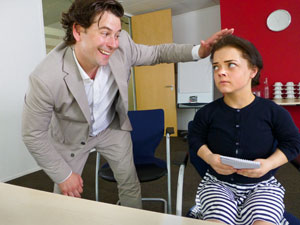
We know that as a charity that wants to change attitudes, we can’t just preach to the choir. We have to go out and talk to people who haven’t engaged with disability in the past. That’s what we try and do with End the Awkward.
We’re also looking forward to the Rio Paralympics and cheering on team Paralympics GB. We’re releasing new polling that looks at the impact of the Games on attitudes to disabled people.
We’ve kicked off some great new projects with young people the last 12 months too. Our Scope for Change campaigners network is working with some amazing aspiring disabled campaigners from right across the country. We support them to bring about change in their own communities and work with them to raise awareness of disability issues.
We’ve also recently launched Scope Role Models, a new programme that goes directly into secondary schools across the country to challenge stereotypes and negative attitudes. We’re really excited about the potential to reach so many young people with our work.
You can find out more at: www.scope.org.uk/campaigns
https://twitter.com/politicana
https://www.facebook.com/Scope

